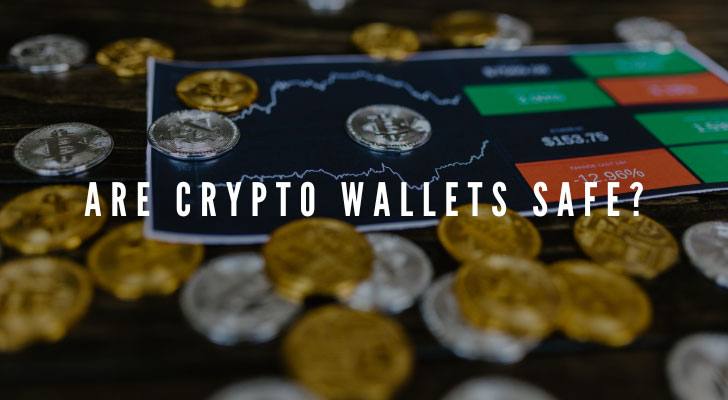The cryptocurrency market has been growing rapidly in recent years, with more and more people investing in digital currencies. But there are still many people who are wary of investing in them. One of the main concerns is safety - are crypto wallets safe? How do they really work? Let’s check the safety of crypto wallets, as well as the potential risks involved in using them.

What Is A Cryptocurrency Wallet?
A cryptocurrency wallet is a digital file that stores your private keys and public addresses. It allows you to send and receive digital currency and monitor your balance. You need a crypto wallet to use Bitcoin, Ethereum, Litecoin, and other cryptocurrencies.
Cryptocurrency wallets come in many forms, including software wallets that are installed on your computer or mobile device, hardware wallets that are physical devices designed for storing private keys, and paper wallets that are printouts of your private and public keys.
Do I Need a Crypto Wallet?
A cryptocurrency wallet is a digital wallet that stores your private keys and public addresses, allowing you to interact with blockchain transactions. You do need a wallet to own and use cryptocurrency. The wallets come in many forms, but the most common are software wallets.
Cryptocurrency wallets are necessary because blockchain transactions are irreversible. This means that if you send currency to the wrong address, there is no way to recover it. With a traditional bank account, you can dispute fraudulent charges and have your money returned. With cryptocurrency, there is no such protection. For this reason, it is critical that you take care when sending or receiving cryptocurrency. Make sure you are sending it to the correct address, and double-check before hitting send.
The other reason you need a cryptocurrency wallet is because of private keys. Private keys are essentially your password for a given blockchain address. They grant you access to your funds, and without them, you would not be able to send or receive cryptocurrency. When choosing a software wallet, make sure it uses strong security measures like two-factor authentication to protect your private keys.
How Do Crypto Wallets Work?
Crypto wallets are safe because they use public-key cryptography to secure their contents. Cryptography is the practice of secure communication in the presence of third parties. In a cryptographic system, there are three important elements:

In public-key cryptography, each user has a pair of keys: a public key and a private key. The public key can be shared with anyone, but the private key must be kept secret. When someone wants to send a message to another person using public-key cryptography, they first encrypt the message using the recipient's public key. Only the recipient, who has the corresponding private key, can decrypt and read the message.
Crypto wallets work by generating a pair of cryptographic keys - a public key and a private key - for each user. The public key is stored on the blockchain and is used to receive funds, while the private key is stored on the user's device and is used to sign transactions. When a user wants to send funds from their wallet, they create a transaction which includes their public key, and the recipient's public key, and signed with their private key. This transaction is then broadcasted to the network where it is verified and included in a block. Once the transaction is included in a block, it is irreversible.
Pros and Cons of Using a Crypto Wallet
When it comes to online security, there are a lot of different opinions out there about what is the best way to protect your information. One method that has become increasingly popular in recent years is using a crypto wallet. But what exactly is a crypto wallet and how safe are they?
A crypto wallet is a type of digital wallet that uses encryption to protect your information. This means that if your computer or phone is ever lost or stolen, your data will be safe as long as you have not shared your private key with anyone. Crypto wallets can also be used to store other types of information such as passwords, notes, and even photos.
There are a few different types of crypto wallets, but the most popular ones are hardware wallets and software wallets. Hardware wallets are physical devices that usually look like USB drives. They are considered to be the most secure type of crypto wallet because they are not connected to the internet and therefore cannot be hacked.
Software wallets are programs that you install on your desktop or your mobile device. They are less secure than hardware wallets because they are connected to the internet, but they are still much more secure than keeping your information in an unencrypted file on your computer.
Now that you know a little bit more about what crypto wallets are, let's take a look at some of the pros and cons of using them.
PROS:
- Crypto wallets offer very strong security for your data since they use encryption.
- They can be used to store a variety of different types of information.
- They can be accessed from anywhere in the world as long as you have an internet connection.
- Some software wallets are free to use.
CONS:
- If you lose your private key, you will not be able to access your data.
- Hardware wallets can be expensive.
- They can be difficult to set up and use if you are not tech-savvy.
Are Cryptocurrency Wallets Safe?
The short answer is yes, cryptocurrency wallets are safe. The slightly longer answer is that it depends on how you use them and which type of wallet you have. Generally speaking, wallets are very secure and the chances of your coins being stolen are very slim. However, there are a few things to keep in mind to make sure your experience with cryptocurrency is as safe as possible.
When it comes to safety, the most important thing is to never lose your private key. This is the string of characters that allows you to access your coins. If you lose this, there is no way to get your coins back. For this reason, it is important to store your private key in a safe place, such as a password-protected file or a hardware wallet.
In addition to keeping your private key safe, you also need to be careful about the wallets you use. There have been cases of people losing their coins because they used an insecure or poorly designed wallet. When choosing a wallet, make sure to do your research and only use wallets from reputable developers.
Lastly, always remember that no system is perfect and there are always risks associated with using any type of technology. However, if you take the necessary precautions, the risks involved in using cryptocurrency wallets are very low.
The Different Types Of Cryptocurrency Wallets
Online wallets are the most convenient to use but are also the most vulnerable to hacks. Desktop wallets are less convenient but offer more security than online wallets. Mobile wallets are the least secure but are the most convenient to use.
Online Wallets
Online cryptocurrency wallets are websites or apps that allow you to store your coins in their digital vault. The coins are stored in a hot wallet, which means they’re connected to the internet and can be accessed by anyone with the right private keys. While online wallets are very convenient, they’re also the least secure type of wallet since they’re constantly connected to the internet. This makes them vulnerable to hacking attempts and malware attacks.
Desktop Wallets

Desktop crypto wallets are programs that you download and install on your computer. Once installed, they generate a unique keypair for you that is used to access your coins. The private key is stored on your computer, while the public key is used to receive payments.
Desktop wallets offer more security than online wallets since they’re not constantly connected to the internet, but they’re still vulnerable if your computer is infected with malware or viruses.
Mobile Wallets
Mobile cryptocurrency wallets are apps that you install on your smartphone or tablet. They work similarly to desktop wallets, but they’re even more convenient since you can use them anywhere. Mobile wallets are the least secure type of wallet since they can be easily lost or stolen, but they offer the most convenience.
How To Choose A Safe Cryptocurrency Wallet
There are a few things to look for when choosing a safe cryptocurrency wallet:
- Reputation - Look for a reputable company that has been around for a while and has a good reputation.
- Make sure the wallet supports multiple currencies. This way, you can store all of your coins in one place.
- The wallet should have strong security features, such as two-factor authentication and multi-signature support.
- Choose a wallet that is compatible with your operating system. This way, you can easily access and manage your coins.
The Best Cryptocurrency Wallets
Some of the most important factors when choosing a crypto wallet include security, ease of use, and supported currencies.
Security is one of the most important factors to consider when choosing a cryptocurrency wallet. You want to make sure that your funds are safe and secure. Look for a wallet that offers multiple layers of security, such as 2-factor authentication or multi-signature functionality.
An easy-to-use wallet is also what you should be looking for. Some wallets can be quite complicated, so if you're not tech-savvy, it might be best to choose a simpler option.
Finally, you'll want to consider which currencies are supported by the wallet. If you want to hold multiple currencies, you'll need to find a wallet that supports them all. Some wallets only support a handful of major currencies, while others support hundreds of different coins and tokens.
When it comes to choosing a reputable cryptocurrency wallet, there are many different factors to consider. Security, ease of use, and supported currencies are some of the most important factors.
Recommended Cryptocurrency Wallets
Coinbase
Coinbase's wallet services are available in 32 countries and its exchange is available in over 190 countries. Coinbase allows users to buy and sell cryptocurrencies, as well as store them in a wallet. The company also offers merchant services, which allow businesses to accept cryptocurrencies as payment.
Blockchain.com
If you're looking for a comprehensive and user-friendly online cryptocurrency wallet, Blockchain.com is a great option. With support for major cryptocurrencies like Bitcoin, Ethereum, Bitcoin Cash, and more, it's perfect for beginners and experienced users alike. Plus, its sleek interface makes it easy to keep track of your crypto holdings and transactions.
Exodus

Exodus is a desktop wallet that is simple to use and has a clean interface. It supports multiple cryptocurrencies including Bitcoin, Ethereum, Litecoin, and Dash. Exodus also provides a built-in exchange that allows you to easily trade between different cryptocurrencies.
Jaxx
Jaxx is another popular desktop wallet that supports a variety of cryptocurrencies. A user-friendly interface and easy-to-use features make it ideal for beginners. Jaxx also offers a ShapeShift integration that allows you to easily convert between different cryptocurrencies.
MyEtherWallet
MyEtherWallet is an open-source wallet for Ethereum and ERC20 tokens. It is simple to use and provides a variety of features such as paper wallet backup, hardware wallet support, and multiple language support.
Coinomi
Coinomi is a mobile wallet that supports multiple cryptocurrencies including Bitcoin, Ethereum, Litecoin, Dogecoin, and more. It is secure and easy to use with a variety of features such as built-in exchanges and support for hardware wallets like Trezor or Ledger Nano S.
Breadwallet
Breadwallet is a mobile wallet for Bitcoin that is simple to use and provides a great user experience. It also has security features such as 2FA authentication and multi-sig support.
Ledger Nano
Ledger Nano is a hardware wallet that stores your private keys offline. Ledger Nano S supports over 1,000 cryptocurrencies. You can store your cryptocurrencies on Ledger Nano S and use them with Ledger Live.
Trezor
With Trezor, your private keys are stored offline on the device itself and never leave it. This means that even if your computer is hacked or someone steals your Trezor, they won’t be able to access your coins.
Trezor is also an open-source project, which means that its code is publicly available and anyone can audit it. This adds an extra layer of security as you know that there are no hidden backdoors or vulnerabilities.
KeepKey
If you're looking for a reliable and secure crypto wallet, you can't go wrong with KeepKey. KeepKey is a hardware wallet that stores your private keys offline, so you don't have to worry about them being hacked. KeepKey also supports multiple currencies, so you can store all your cryptocurrencies in one place.
BitLox
BitLox is a hardware wallet that allows you to store your bitcoins offline in a secure environment. The device itself is a small USB drive that comes with its own software and can be used on any computer. BitLox also offers a mobile app for Android and iOS devices.
It has been praised for its security features. One of the main advantages of using BitLox is that your private keys are never exposed to the internet, which reduces the risk of theft or hacking. Additionally, BitLox offers multiple layers of security, including PIN codes, pass-phrases, and 2FA.
Digital Bitbox
Digital Bitbox is a cryptocurrency wallet that provides security through multi-factor authentication and hardware encryption. It also offers a number of features that make it easy to use, such as a built-in exchange and customer support.
Comparison Table
When it comes to choosing a crypto wallet, there are many different factors to consider. Here is a comparison table of the top cryptocurrency wallets to help you make a decision.
- Wallet Type: There are many different types of wallets, including web wallets, desktop wallets, mobile wallets, and hardware wallets. Consider what type of device you will be using the wallet on and choose accordingly.
- Supported Cryptocurrencies: Not all wallets support all cryptocurrencies. Make sure that the wallet you choose supports the cryptocurrencies that you want to use.
- Security: Security is important when it comes to cryptocurrency wallets. Look for features such as two-factor authentication.
- Ease of Use: Some wallets are easier to use than others. Consider how comfortable you are with using different features like sending and receiving cryptocurrencies.
- Price: There are some wallets that are free, while there are others that are priced. Consider how much you are willing to pay for a wallet before making your decision.
How To Store Cryptocurrency
If you want to store cryptocurrency, there are a few different ways to do it. You can either keep it on an exchange, in a wallet on your computer or phone, or in a physical wallet.
Exchanges are good for short-term storage or for trading, but they are not always very secure. You don’t want your exchange hacked and find your coins gone all of a sudden. That’s why it’s important to use a wallet for long-term storage.
There are two types of wallets: hot wallets and cold wallets;
- Hot wallets are connected to the internet and cold wallets are not.
- Cold wallets are much more secure, but they can be a little harder to use.
If you want the most secure option, you should get a hardware wallet like the Trezor or Ledger Nano. These are physical devices that look like USB drives. They hold your coins offline and allow you to sign transactions with a button press.
You can also use software wallets like Exodus or Jaxx. These are programs that you install on your computer or phone. Their security isn't as good as hardware wallets, but they are easier to use.
Conclusion
There is no doubt that crypto wallets are safe. The question is, how safe are they? And the answer to that question depends on a number of factors. If you're looking for a safe and secure way to store your cryptocurrencies, then a crypt wallet is definitely worth considering. However, if you're not careful about which wallet you choose, or if you don't take steps to protect your wallet, then you could be putting your coins at risk. So make sure you do your research and only use wallets from reputable sources.
Did You Know You Already Have A LOT To Sell?
So What's Your Problem?

